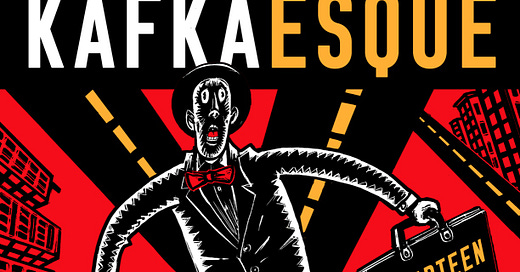Early this year, I received two emails from Davis Parks, a Northwestern student enduring a Kafkaesque ordeal. He agreed to let me share his story with the world:
As a student at Northwestern University who’s finished a triple major in econ, stats and math but can’t graduate, I’ve found myself disenchanted with (and frankly insulted by) the education system. I’ve finished all the relevant coursework in 7 quarters (2 1/3 years), but they have an arbitrary 9 quarter requirement that “is an important component of that undergraduate experience” according to the Provost (that sounds like an admission that signaling is more important than academic credentials!).
After years of being told by teachers to go into engineering, I thankfully realized I’m interested in statistics far more than hard science. That led to me taking the first actuary exam in high school, getting the top score. But of course, I was unable to get an internship because employers love college credentials.
Fast forward to 2020 and NU suspended in-person classes for four consecutive quarters. I took the time to take extra classes thinking they’d let me graduate early given that the school offered an inferior product for over a year. But as I said, they deem the “college experience” to be an important part of the diploma. It’s all absurd because I only need two classes per quarter and I can even take one pass/fail (ahem, I mean “pass/not pass”) and fail it without impacting my GPA.
Recently, he sent me a happy follow-up email. One of my blog readers reached out to Parks, with anti-Kafkaesque results. The happy update, reprinted with his permission:
Dear Professor Caplan,
I hope you're doing well and had a great trip in Europe! I've enjoyed following your Twitter posts, especially after reading Labor Econ Versus the World and Open Borders…
All that aside, I actually write to thank you. A few weeks ago, I found a message sent to my LindedIn account back in January inviting me to apply for an actuary-adjacent job. It turns out, this was in response to the EconLib blog that you featured me in where I expressed frustration with my college experience, detailing how the university prioritized petty requirements over skill and effort. I applied for the job immediately. As expected, the interview process was highly technical with comparably less emphasis given to my on-paper accomplishments. Somehow, I made it through that process without embarrassing myself and ended up getting an offer last week that I officially accepted yesterday.Over the past week, it's become a bit of a joke in my family that I took out over $130,000 in student loans to go to college to get a job... only to get a job by complaining about said college. Of course, none of this would have happened without The Case Against Education nor without you graciously responding to my long emails and giving me a platform to air my grievances. I'm completely indebted to you for creating this great opportunity for me. Plus, you gave me great source material for roasting Redditors who think college teaches students to "think logically."
If I'm in Fairfax, lunch is definitely on me now. It's the least I can do.Take care,
Davis
In the past, people working in alternative education start-ups have told me that The Case Against Education inspired their work. As far as I recall, though, this is the first time that my critique of socially wasteful signaling has actually helped anyone skip a pile of socially wasteful signaling.
I doubt the Davis Parks story is replicable, but if you’d like to tell the world about how the educational status quo continues to stand between you and your career potential, please share in the comments.











It may be replicable - like David said, what was missing was the exposure. And this level of exposure could be enough to bypass the chicken and egg problem of network effects.
Your stamp of approval, even tentative, might help recruitment marketplaces that focus on expertise instead of credentials, in one form or another. You could even try to crowdsource finding them.
I remember running headlong into a similar requirement at Cornell. I wasn't particularly enjoying my college experience in my second semester of sophomore year, so I figured I could take heavier course loads, finish the requirements a year early, and move on with my life. The adviser informed me that this was not possible. Not only did Cornell have a similar on-campus-semesters requirement to NU, they also required you to meet an arbitrary credits threshold 4 semesters prior to your graduation (i.e., by the end of freshman year if you wanted to graduate a year early). Basically, I couldn't graduate early even if I completed all of the requirements just because I hadn't thought of the idea early enough. I sucked it up and stayed and it all worked out fine for me in the end (other than the extra money and wasted time incurred), but it's pretty obvious to me that "gotcha!" requirements like that weren't written to benefit the students.